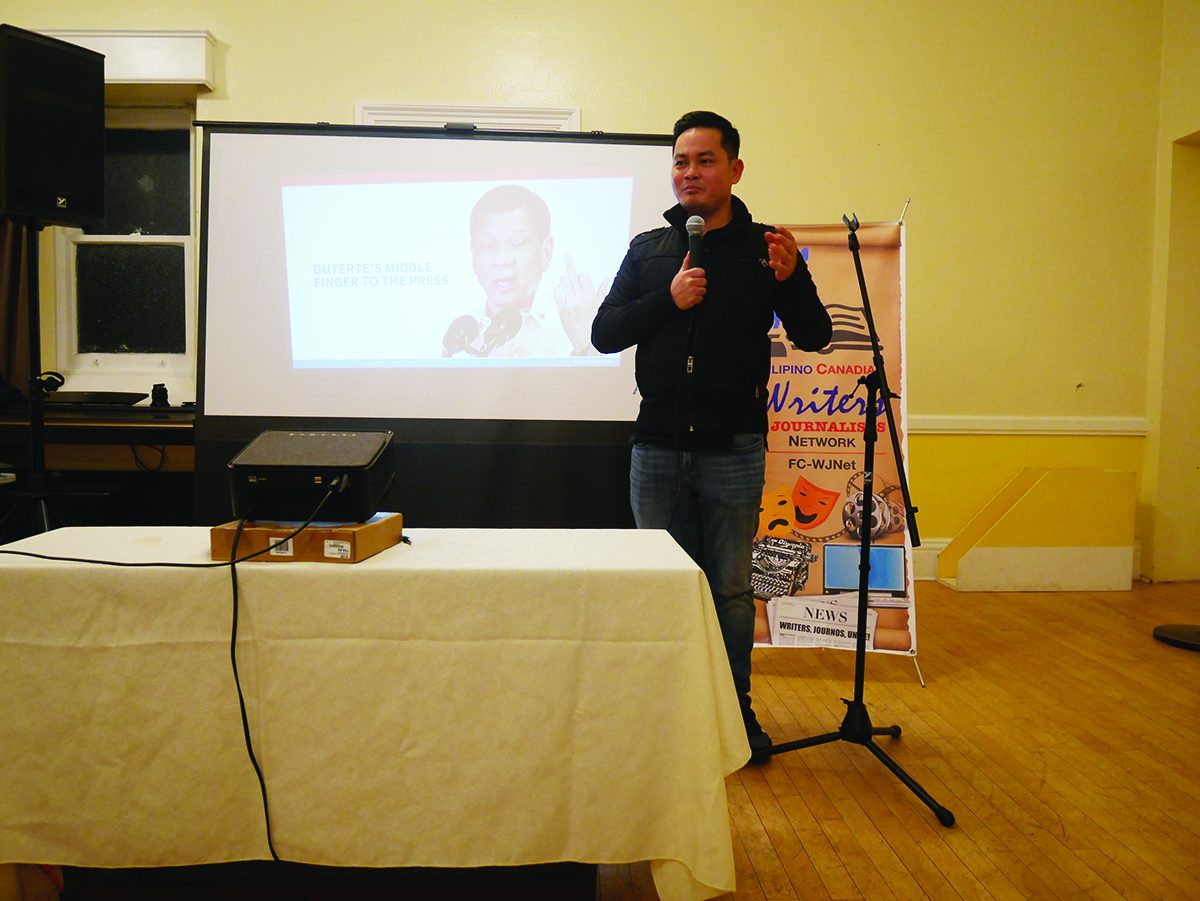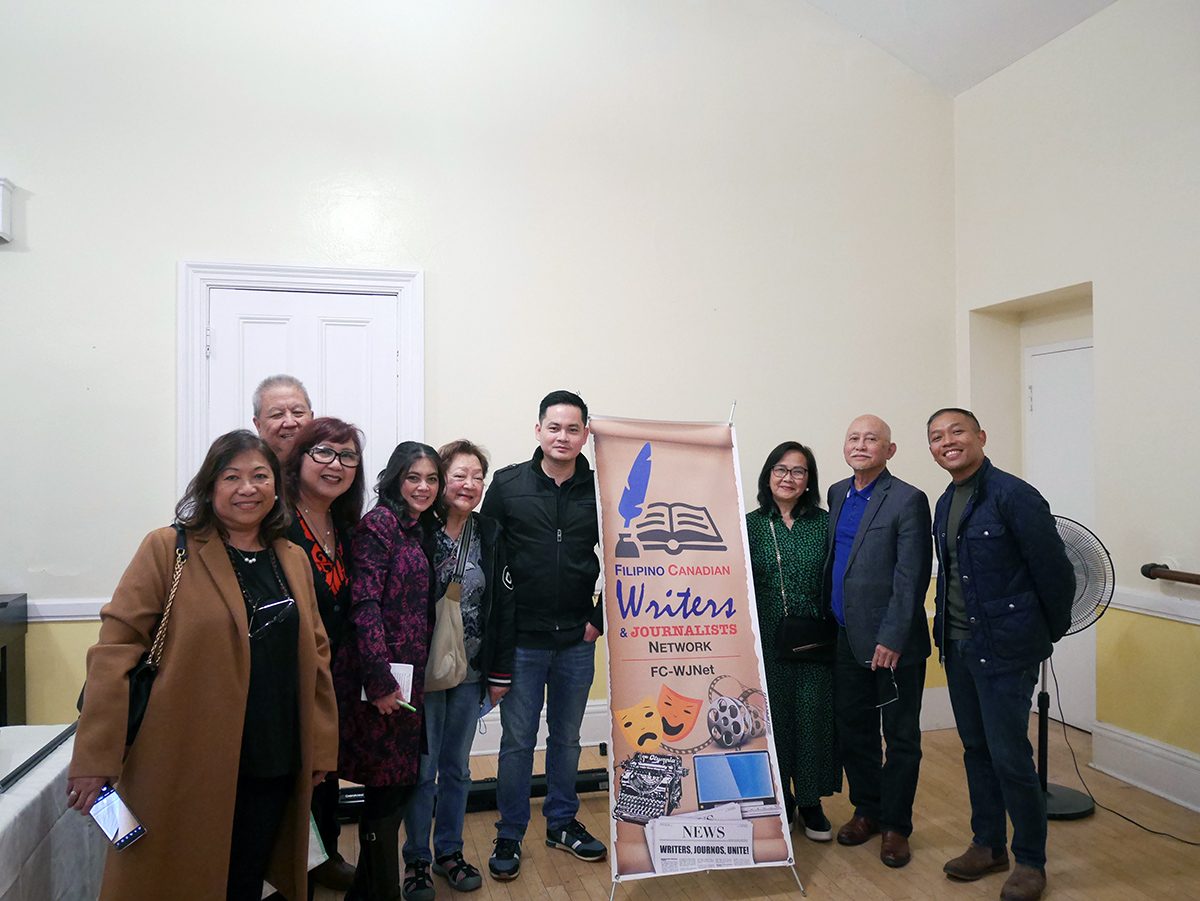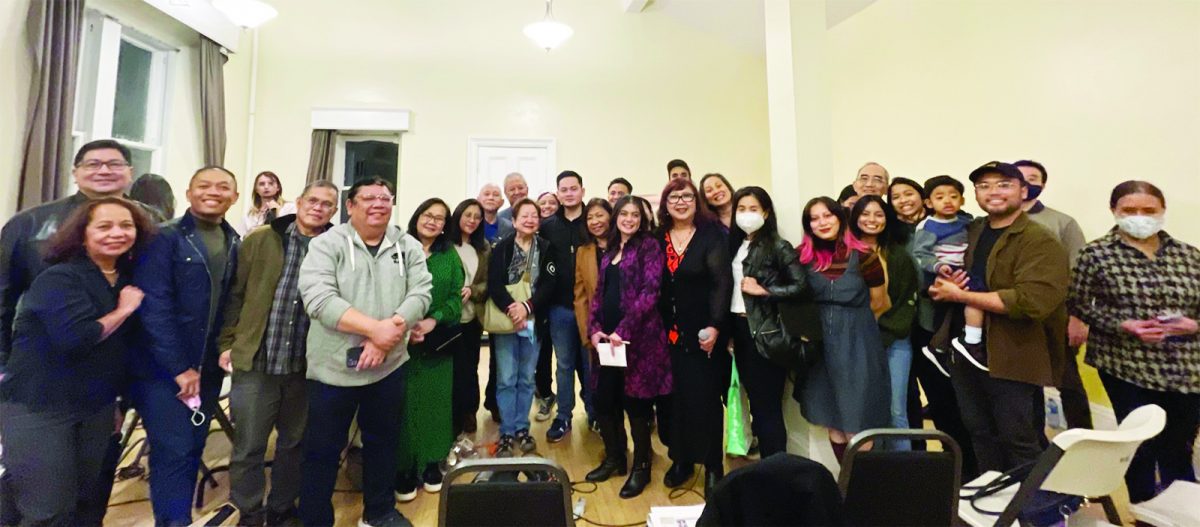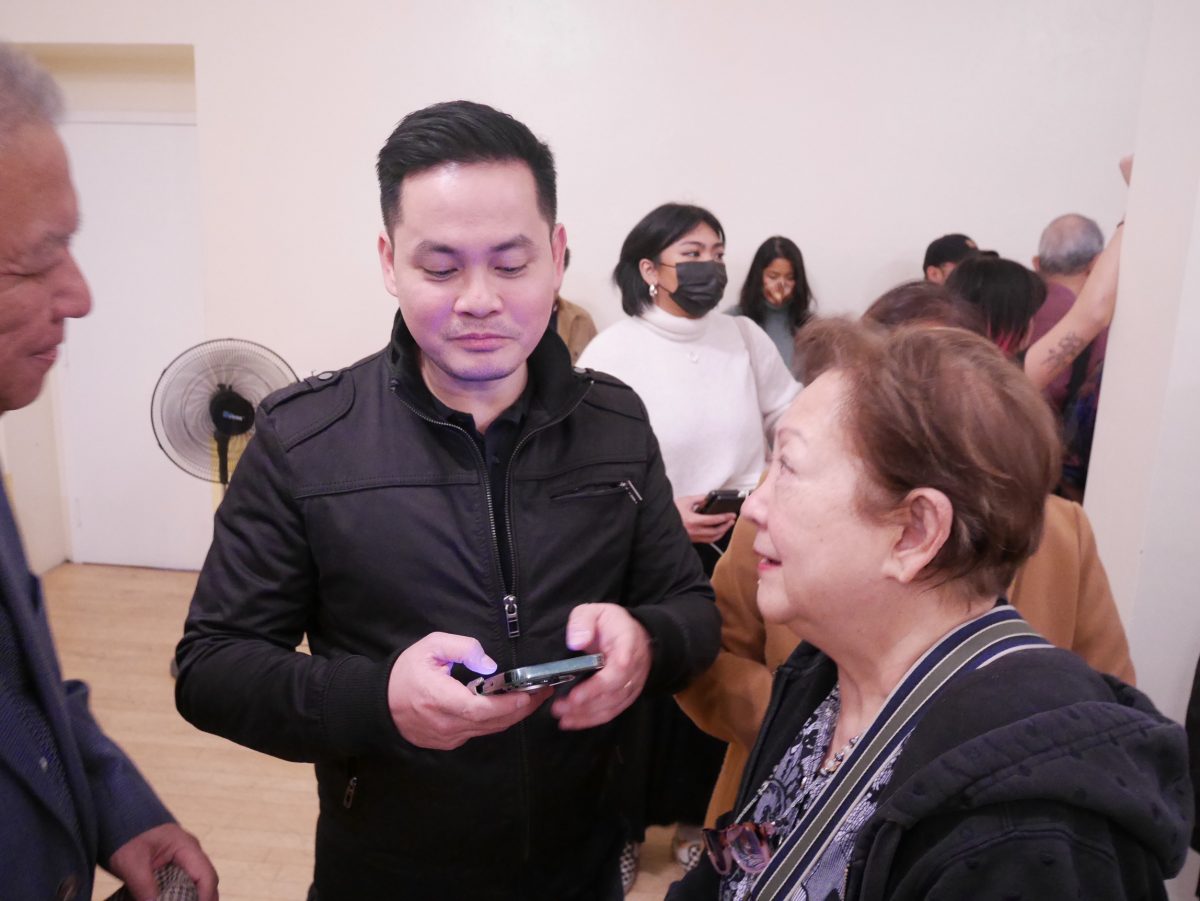Christian Esguerra talk in Toronto draws diverse reactions
Christian Esguerra talk in Toronto draws diverse reactions

Christian Esguerra at the Trinity-St. Paul Centre on Bloor St. West, Toronto.
2020-2021 Marshall McLuhan Fellow speaks on disinformation phenomenon in the Philippines
By Mila Astorga-Garcia
The Philippine Reporter
TORONTO— Christian Esguerra, Marshall McLuhan Fellow for 2020-2021, gave a talk Nov. 6 at the Trinity St. Paul’s Centre in Toronto before a community audience composed mainly of Filipino-Canadians. Esguerra’s topic was “Democracy at Stake: How media battles the disinformation phenomenon.”
Disinformation, currently a relevant issue in the Philippines, and Esguerra, being a popular broadcast journalist in the Philippines that tackled burning social and political issues in his program “Fact First,” the event had attracted a full capacity audience of 120 people diverse in age and background – boomers and millennials, workers, professionals, members of the academe, church denominations and media.
Esguerra’s prepared talk, organized with the help of Powerpoint slides with charts and photos, covered mainly the theoretical meaning, difference between, and examples of disinformation and misinformation. (The more comprehensive article regarding the content of his presentation, highlighted in slides, will be published in the next issue.)
The question and answer portion generated interesting information that prompted an engaged audience participation that would have lasted for hours, if time and space use were not limited.
Esguerra revealed his kind of journalism which he says he has practiced for 22 years now from the time he was a reporter at The Philippine Daily Inquirer, to being a broadcast journalist with ABS-CBN, and now as an independent anchor in his own online program on Youtube.
The discussion allowed a glimpse of Esguerra’s views on some of the critical issues in the Philippines today affecting journalists and others, such as red-tagging, which has resulted in the killing of journalists and other critics of the government, and the outcome of the 2022 Philippine elections that resulted in the presidency of Ferdinand Marcos Jr, referred to as BBM (for his nickname, Bongbong Marcos).
Even when the event was over, people continued to talk about Esguerra’s presentation and responses to the questions raised by members of the audience. Hence, The Philippine Reporter conducted a quick informal survey to capture the audience’s diverse reactions. Due to deadline pressures of the newspaper, respondents who had either volunteered or were randomly approached for this purpose and met the deadline are included in this story.

From left: Beth Ruivivar, Chito Villaroya, Agnes Manasan, Nova Rellosa-de Leon, Livvy Camacho, Christian Esguerra, Mila Astorga-Garcia, Hermie Garcia and Carlo Figueroa.
Five basic questions were asked and the respondents were made to respond to any or all of them. The questions are:
Was the disinformation phenomenon clearly understood by you after the presentation, especially how it puts democracy at stake? How does Esguerra see the role of the journalist in battling the disinformation phenomenon? How does BBM figure in the disinformation phenomenon? How does Esguerra see BBM? Is red-tagging part of the disinformation phenomenon? Is it an isolated practice or is it institutionalized considering its pervasive use against critics of government? How does Esguerra see this problem? Overall, are you satisfied with how Esguerra explained and elaborated on the topic? (Example, was it clear from his presentation who is committing disinformation the most and who are benefitting from it?)
RESPONSES
Al Quinn Alquinto (youth, student):
The disinformation phenomenon was explained in clear fashion. Esguerra breaks down the difference between misinformation and disinformation which is intentional. He explains that disinformation and its machinery makes it more difficult for the masses to get the right information especially in the topic of politics. This benefits those already in power and makes it harder to hold public officials accountable. He also explains that the polarity of truth within the current media ecosystem contributes to the disinformation.
He sees the role of a journalist is to present the facts and the truth. Within battling disinformation, he found it important to provide full contexts. In the context of disinformation, he mentions that journalism has a lot of “strings attached” which makes it harder to do journalism in more renowned institutions like broadcast companies.
Christian sees BBM as having benefited from the disinformation phenomenon that started much before his running. Because of the rampant disinformation and historical distortion, it allows BBM the flexibility to do what he wants publicly and politically. Christian makes a distinction between BBM and his father and how we can’t lump them together as the same kind of leader. Christian is highly critical of BBM from how he got into power and his current time in power. But this analysis of his applies to other presidents as well.

Esguerra and Carlos Figueroa with audience that peaked at 120.
Christian sees red-tagging is part of the disinformation phenomenon in the sense where it intentionally antagonizes a group or an individual by placing a “red” label on them as “communist terrorists”. Red -tagging can occur both in isolated and informal cases like citizen red-tagging others or in an institutionalized manner such as the NTF-ELCAC with the use of state agents. The issue Christian brings up is that even individuals such as journalists and groups who are critical of the current administration are lumped into this grouping.
Overall, I found it great how he explained disinformation and its mechanics from a journalist’s point of view interacting with the media. What I understood from this is the beneficiaries of disinformation are the elites with the most resources that fuel this cycle. It makes it harder for them to be held accountable in this manner.
Bern Jagunos, (retired United Church officer, human rights advocate):
It is the position of Karapatan, National Union of People’s Lawyers (NUPL) and other Philippine human rights organizations as well as international organizations such as Human Rights Watch that red-tagging has been institutionalized under NTF-ELCAC, as the lead implementing agency of the government’s “whole of nation” approach to the counter-insurgency war. UN rapporteurs also cite the widespread and systematic use of red-tagging to eliminate dissent and silence government critics including human rights defenders. What I heard from Christian’s answer is that he does not think it has been institutionalized.
Regarding red-tagging, I think Christian’s approach was more anecdotal than analytical. He presented the situation and issues from his own experience. He did get people’s interest and attention, maybe because his stories were personal. But he didn’t provide more in-depth analysis.
My question was actually whether Marcos Jr. has adopted “disinformation” as a governance strategy and institutionalized it in the practices of government agencies/branches, in the same way that red-tagging has been. If disinformation is a government strategy, then it is practiced by various branches of government in a deliberate and systematic way. Not just a general phenomenon. Marcos effectively used disinformation as the strategy to win the election, so why not in his governance to control, maintain and possibly extend power? I didn’t get his perspective on this.

Christian Esguerra with Chito Villaroya and Livvy Camacho.
Christian himself said he’s a journalist, not an activist. And I don’t think the Canadian embassy would give the Marshall McLuhan award to an “activist” journalist. Last month, the Committee for Media Freedom and Responsibility gave the Award of Distinction to Len Olea of Bulatlat, but the Embassy gave the Marshall McLuhan Fellowship to Karmina Constantino of ABS-CBN.
Edmund Muyot, (baby boomer visual artist, human rights activist, martial law survivor):
(Five brief responses given in the order of the five questions.–Ed.)
* Very much so. It added dimension to what I’m receiving in the social media.
· He is very courageous indeed in the light of the recent killings of a radio commentator and an editorial cartoonist. I would see him as a truth teller in the midst of lies.
· The way I perceive it, BBM tries to portray himself as a mere spectator by trying to be quiet.
· It is an institutionalized tactic but Christian can only speculate if the intel agencies or the military psywar experts have a hand on it.
· I’m very much satisfied and (the presentation was) not done in a very intellectualized manner making it easy to absorb.
Josefina Forcadilla,(baby boomer, human rights advocate, martial law survivor):
In his presentation, the disinformation phenomenon is not clearly understood. He was not explicit on who does or which group in the government is responsible for this disinformation. What he presented is only the general disinformation phenomenon that is happening in the Philippine context.
Christian sees the role of the journalist as being neutral and not taking sides which for me is problematic, since there is no way a journalist will remain neutral when your colleagues are being arrested or murdered! It’s either he takes a stand or toe the line of the government. He is already in that position where he can present the truth; why not use that opportunity to take a stand against injustice?
When Christian mentioned BBM did not cheat or rig the election, this is false and I took it as someone who is spreading disinformation. He should have checked his facts first before he made this statement. It’s like when he said BBM will not follow in his father’s footsteps, but look at the latest update from KARAPATAN: According to the UP Third World Studies Center, from July 1, 2022 to November 7, 2022, 127 individuals died in Marcos Jr.’s drug war. Majority of them were killed by state agents, despite the Philippine National Police’s claims of “bloodless” anti-narcotics operations under the Marcos Jr. administration. KARAPATAN documented 442 civilians, mostly peasants, indigenous and Moro peoples killed during the Duterte administration’s counterinsurgency campaign. At least 222 of them are human rights defenders. Ten civilians have been reportedly killed by elements of the Armed Forces of the Philippines during the first three months of the Marcos Jr. administration, while four defenders have been forcibly disappeared.
I see red-tagging as part of a disinformation strategy by the government since it sows lies against an individual or groups. On the other hand, it is also a sign of threat, harassment and intimidation because once an activist or HR defenders are reg-tagged, you are marked and can be arrested, abducted and never surfaced, or worse extrajudicially killed. Red-tagging has become institutionalized as evidenced by its widespread use all over the country in eliminating activist and human rights defenders which is systematically being carried out by NTF-ELCAC. “In his address to the UN Philippine Universal Periodic Review (UPR) Watch on October 12, 2022, Department of Justice Secretary Jesus Crispin Remulla admitted that red-tagging is a part of democracy. His remarks, while brazen official admission of the practice, do not only encourage and normalize red-tagging but also brandish it as an institutionalized and orchestrated method of the government in dealing with perceived “political critics”, according to a KARAPATAN statement dated October 13, 2022.
Philip F. Kelly PhD (he/him) (Professor of Geography, Associate Dean for Research, Graduate and Global Affairs, Faculty of Environmental and Urban Change, York University):
Was the disinformation phenomenon clearly understood by you after the presentation, especially on how it puts democracy at stake?
Yes, very clear indeed. I was particularly struck by his explanation of how troll farms work in the context of electoral contests.
How does Christian see the role of the journalist in battling the disinformation phenomenon?
— Rigorous fact checking (and “BS detection”) when disinformation is being propagated;
— Adhering to journalistic principles in the face of the political and economic interests of media owners or attempted bribes;
— Remaining courageous in speaking truth to power.
How does BBM figure in the disinformation phenomenon? How does Christian see BBM?
He clearly doesn’t see him positively, and made a convincing case that BBM is the beneficiary of years of disinformation and a climate of fear and self-censorship in the press. But Christian was also clear that he would take an equally critical stance in relation to anyone in power.
Is red-tagging part of the disinformation.phenomenon? Is it an isolated practice or is it institutionalized considering its pervasive use against critics of government? How does Christian see this problem?
I think red-tagging is integral to the authoritarian impulse to find an “other” to scapegoat, blame, ostracize etc
Overall, are you satisfied with how he explained and elaborated on the topic? (Example, was it clear from his presentation who are committing disinformation the most and who are benefitting from it?)
Yes, I thought it was an excellent talk. He was remarkably frank and blunt, especially given that he was speaking to an audience that could (for all he knew) have been very diverse in its political viewpoints.
———————————
The Toronto Marshall McLuhan event, a program of the Canadian Embassy in Manila, was organized by the Filipino Canadian Writers and Journalists Network (FC-WJNet) and its partners and co-sponsors, Filipino Network-United Church of Canada, University of the Philippines Alumni Association-Toronto (UPAA-Toronto), Malaya Canada, Anakbayan Toronto. National Ethnic Press and Media Council of Canada (NEPMCC), National Union of Journalists in the Philippines-North America (NUJP-NA), Canada Philippines Solidarity Organization (CPSO) and Migrant Resource Centre Canada (MRCC).
The event organizing involved all voluntary work and sharing of resources among the nine partner organizations, with Filipino Network-United Church of Canada volunteering to pay for the cost of the space rental in a Toronto church venue; CPSO providing audio technical services; FC-WJNet providing promotions and media literature, liaison with the Canadian Embassy Communications Officer Carlo Figueroa, and overall coordination among the partners; Filipino Network-United Church of Canda and Anakbayan Toronto helping in the initial search for a suitable venue, taking charge of the registration desk, providing cultural entertainment, and providing video assistance; UPAA-Toronto for emceeing the program and moderating the Q&A; MRCC in providing masks as safety protocol tools; and everyone assisting in food donations, disseminating information and inviting people to attend.
The organizers thanked Esguerra for his presentation as well as Canadian Embassy’s Figueroa, who informed FC-WJNet that his office would like the group to sponsor once again the Marshall McLuhan Toronto talk of two Fellows next year: 2022 Fellow Karmina Constantino to speak in Toronto in May 2023; and a still to be chosen journalist as 2023 Fellow to speak in Toronto in November 2023.
This year’s event is FCWJNet’s fourth sponsorship of the Marshall McLuhan Fellow community events in Toronto starting with Jeff Canoy, Manny Mogato, Patricia Evangelista, then Christian Esguerra.
The organizing partners acknowledge the following food, coffee and water donors: Mendoza Bakery, Casa Manila, Mama Linda’s Kitchen, Krispy Kreme Donuts, UPAA-Toronto, Lui Queano, Ricky Esguerra and Edith Muyot.
Comments (0)